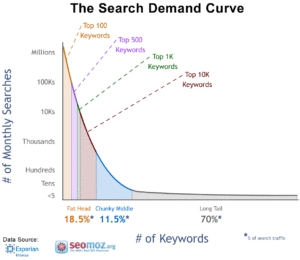We get questions like these A LOT: How do I get my website found? How do I show up on the first page of a Google search? How do I get more eyes on my business?
While there are tons of great answers to those questions, today we’ll focus on one specific answer: use long-tail keywords.
Now, you may be wondering, “What are long-tail keywords?”
In short, they are keyword phrases related to your business that people often search. You may have noticed longer phrases populating your search box, almost as if they know what you’re going to say. And that’s because they kind of do. Believe it or not, you probably aren’t the first person to search “Why do dogs mimic siren sounds?”
So, what does this mean for your small business? It means that it’s time to start paying attention to more than just the words that describe your business and start focusing on the phrases. ‘Cause this race moves fast, but you can definitely start winning it.
The Tale of the Tail
Confession time: the term “long-tail” is kind of elusive. Does it refer to an animal tail? And why is it long?
If you’re wondering what are long-tail keywords, here’s the answer straight from the source, author Chris Anderson:
“The theory of the Long Tail is that our culture and economy is increasingly shifting away from a focus on a relatively small number of “hits” (mainstream products and markets) at the head of the demand curve and toward a huge number of niches in the tail.”
Simplified, that means that only a few of the big businesses and popular websites will appear when you search for single keywords. But when you get into the nitty-gritty with long-tail key phrases, you’ll see results that are more likely to answer your specific query.
For example, let’s say you manage a bookkeeping business. A potential client in Houston is looking for bookkeeping services in a Google search. If they just search “bookkeeper,” their search results will likely turn up an abundance of bookkeeping services everywhere. That means they’re highly unlikely to find your small business in the sea of other businesses.
But, if they enter “small business bookkeeping service for salons in Houston, Texas,” the search will return results more relevant to your business. Instead of getting every bookkeeper around the country, they’ll see those focused on salon businesses in Houston. Like you.
If you’re visual like us, this graph can help. At the very left, you see major searches of specific keywords. The more searches for the top keywords, the fewer smaller businesses appear in search results.
At the bottom, are the long-tail phrases. Long-tail searches receive 70 percent of search traffic compared to only 18.5 percent of sites at the top. It pays to know what your potential clients are looking for.
Source: Moz.com
Winning the SEO Race
If you’re asking what are long-tail keywords, you’re already trying to figure out how to compete for the attention of potential clients. Y’all want to be on that first page of results, so you can win the lead generation race.
To do that, you need great content that uses well-researched keywords and phrases. Remember, content isn’t just the words you see on a page—it’s also videos, images, links, and emails. Basically, anything contained on your digital platforms.
Integrating long-tail keywords into content can take the form of using the phrases in your website copy, but it could also be applying tags to photos and videos, and adding meta descriptions to your pages. Having content that reflects who you are and speaks to who your clients are is a great way to generate leads and get more eyes on your small business.
Finding the right keywords and phrases is an important part of SEO. Keyphrases change as trends come and go. It’s important to have a solid digital marketing strategy to ensure that you’re winning the SEO race for the long-term.
One way to ensure you’re getting the best ROI and winning that SEO race, is to partner with an experienced digital marketing agency. They will have the tools to do keyword research, review your current strategy, and create a plan for how to increase your digital presence and connect with your target audience. I know we’re all about the connection over here.
Natural & Organic Aren’t Just Food Terms
These days, with the ubiquitous use of voice technology, people are searching in an entirely different way than even five years ago. Instead of a single word, searches look and sound more like the way people think and talk in everyday life. They’re natural; organic.
When considering what your long-tail keywords are, remember that organic search results are those not produced by ads. There’s nothing wrong with using ads, but to get the best ROI, you’re better off being mindful of your content and usage of long-tail keywords. Some simple tweaks in your content can net huge results, especially over the long-term.
If you’re not sure how people search for businesses like yours, try going to message boards, online reviews, and comments. Those are all great places to see how people talk about your business, or others like yours. Once you have a better idea of how people are talking, you or your digital marketing strategist can develop long-tail keywords that target niche markets.

The whole SEO and keyword stuff can get pretty overwhelming. We don’t want you to feel overwhelmed—we want you to feel empowered and successful in your business goals. If you need help getting your long-tail keyword strategy on track, then contact Wayward Kind. We’re totally ready to be your digital cross-country coach!






